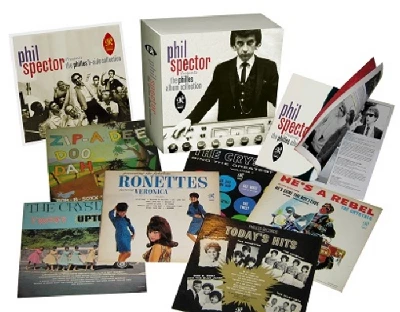published: 27 /
10 /
2011

'Phil Spector Presents the Philles Album Collection' is a new seven CD box set featuring most of the albums from Phil Spector's Philles label. Andy Cassidy reflects back on the album career of singles man, Phil Spector
Article
It seems a strange proposition to expect the record-buying public to shell-out for a set of albums celebrating the career of someone who famously described LPs as “two hits and ten pieces of junk,” but when the someone is question is Phil Spector, strangeness goes with the territory.
With hits such as 'Spanish Harlem' and 'To Know Him is to Love Him' to his name, Phil Spector was already an established and respected session player, writer and producer by the time he formed Philles Records with Lester Sill in 1961. It is, however, probably for his work with the Philles label that Spector will be best remembered.
Specialising in singles by girl bands, Philles did release a few albums, most notably the perennial yuletide favourite 'A Christmas Gift for You'. With this notable exception, Spector’s albums were little more than vehicles to promote his “two hits.” Sadly, with this box set, Spector’s dislike for albums is all too apparent.
Of the seven discs in the set, three are albums by the Crystals; 'Twist Upon'(1962), 'He’s a Rebel' (1963) and 'The Crystals Sing the Greatest Hits Volume 1'(1963). This leads to my major issue with the compilation: repetition. Of the eleven tracks on 1962’s 'Twist Upon', nine make their way onto the album’s sequel 'He’s a Rebel'. Essentially, 'He’s a Rebel' is 'Twist Upon' with the two weakest tracks ('Please Hurt Me' and 'Gee Whiz Look At His Eyes') removed and replaced with three new, and more radio-friendly, tracks. To my mind in a seven disc set this level of duplication is unforgivable. And it gets worse. Disc four of the set, 'The Crystals Sing The Greatest Hits Volume 1', features six tracks already featured on one or both of the previous albums. Of the thirty-five tracks by the Crystals over the three LPS, only twenty are not duplicated.
The third disc of the set, 'Zip-A-Dee-Doo-Dah' by Bob B. Soxx and the Blue Jeans, is, in terms of production, a marvel, and while the material may not be as strong as some of Spector’s other releases (the album features the standards 'The White Cliffs of Dover' and 'This Land is Your Land'), Darlene Love’s vocals and Spector’s arrangements are still breathtaking.
By far the most enjoyable album of the bunch is disc five, 'Philles Records Presents Today’s Hits', and while some of the tracks are featured elsewhere on this box set, the convenience of having so many incredible tracks on one CD is worth overlooking any complaints. Featuring such Spector staples as 'Then He Kissed Me', 'Be My Baby', 'Da Doo Ron Ron' and 'Why Do Lovers Break Each Other’s Hearts?', it’s an album that should grace every collection.
Disc six is another terrific LP, 'Presenting the Fabulous Ronettes Featuring Veronica'. Put simply, it’s twelve tracks of teeny-bopper perfection, with Veronica Bennett (later Ronnie Spector)’s voice and Spector’s by then perfected Wall of Sound technique put together to incredible effect. The sheer quality of material on the album is fantastic; 'Be My Baby', 'Chapel of Love', 'Walking in the Rain', 'So Young', 'Baby I Love You' and more besides.
Disc seven offers another insight into Spector’s respect for the single as an art-form. 'Phil’s Flip-Sides' is a seventeen track collection of orchestral B-Sides to Spector’s singles. None of the music is particularly remarkable, but perhaps that was the point: there was no way a DJ could mistake the B-Side track for its flip-side. I suppose it has its place, and for completists it represents an interesting diversion, but it’s not a disc I will find myself going back to very often.
The seven discs of 'The Philles Album Collection' capture much of Spector’s greatest work, but the package contains a great deal of filler which would be of little or no interest to the casual listener. The duplication of so many tracks is a major issue, as is a full album of throwaway material. The box set, therefore, is not something I would recommend except to the Spector fanatic. For the casual listener or someone keen to begin their Spector journey, 1991’s 'Back to Mono box' set is excellent value, and, to paraphrase the man himself, “all hits, no junk.”
Picture Gallery:-

